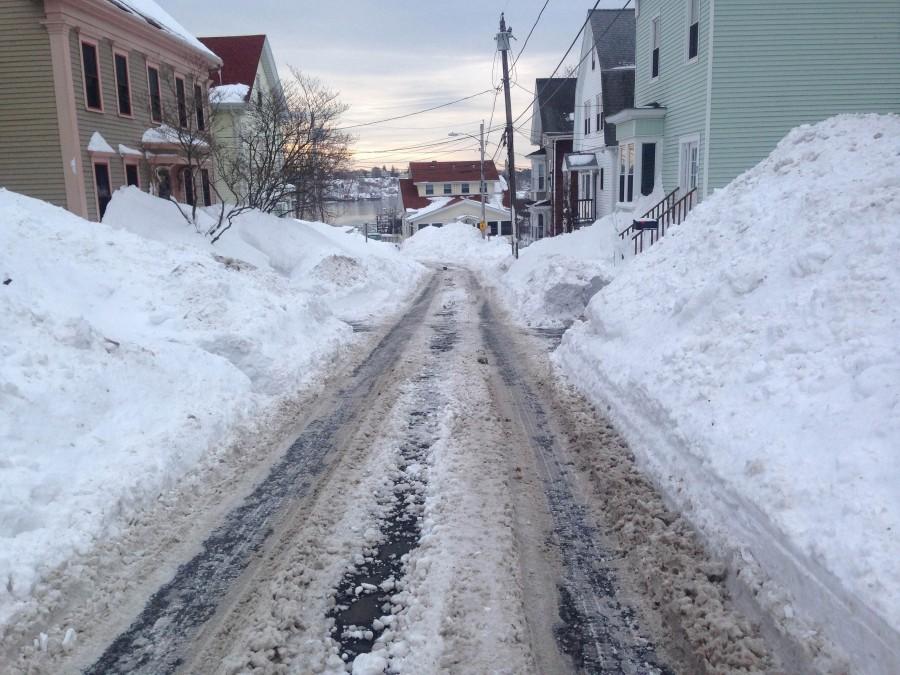Snow survival: science style
It may be difficult to notice, but it has snowed quite a bit over the last few weeks. So much so that the state department of transportation has already spent almost double its snow removal budget of 45 million dollars, spending 84 million.
To put that in perspective, one million dollars in hundred dollar bills, all stacked up, is about the width of a washing machine. Imagine spending 84 washing machines worth of Benjamins just to move some frozen water. That is the scale of the thorn in the state’s side that all this snow has provided.
Thus, with all that money comes plows. Lots and lots of plows. Unfortunately, there’s no laser gun or flamethrower that can just melt it all, so the question arises. Where do we put it all? It wouldn’t be a problem if we lived in Maine with giant empty fields everywhere to put all the stuff, but all we have around here is people and a lot of oceans.
So the city has a dilemma: do we dump the snow in giant snow banks around the city where it obstructs people’s vision while they drive and causes accidents, or do we just dump it in the ocean? It’s just water, right?
WRONG. I’m going to try not to bore you with too much ecology, but have you ever tried putting a saltwater fish in fresh water? It does not end well. Unfortunately, snow is pretty fresh. Even with the salt we dump on it (which I’ll get to later) it still isn’t salty enough to match the salt in the ocean, so any living thing, from algae and bacteria to crabs and baby fishies, are going to be severely hurt, if not outright killed.
Now, it’s not usually a problem when it snows because there’s enough water in the ocean to balance out the freshness of snow in flakes, when it is all spread out. However, when we take an entire dump truck full of the stuff and plop it down in there like an ice cube, that’s an awful lot of fresh water to put all in one place at one time.
Now, that can be forgiven. After all the alternative is to leave all the snow there and watch the fireworks, but proper planning could have avoided a lot of consequences. For example, everyone’s favorite snow removal “solution”, rock salt. Out of 84 million dollars, you had better believe that after paying plow owners for their work, rock salt must be a large part of the expenditure.
If salt is spread before the snow hits, the salt dissolves into the snow while it is still in small crystals, raising its freezing point so it can no longer stay frozen at relatively high temperatures. Not technically “melting” per se, but more just failing to stay frozen.
However, if salt is dumped onto snow after it has accumulated, it cannot dissolve as effectively, and results in a salt Slurpee on the road. This would not be so bad, if we did not have an entire city’s worth of cars, spinning wheels against that slush, and throwing it up on the the vehicles behind them, and upwards into their own inner workings. Salt is infamous for its ability to dissolve metal, and all that salty slush destroys cars like no one’s business.
My point with this mini-chemistry lesson is that if the state had not been stingy from the beginning, and properly prepared for the storms, laying down salt before the snow got too bad, that slush would not even be there, and therefore our cars would be safe. The problem here is state policy.
According to malegislature.com, according to section 31D of the general laws of Massachusetts, “Every city or town shall annually, not later than September fifteenth, report to the division of local services of the department of revenue the total amounts appropriated and expended, including any funding or reimbursements received from the commonwealth, for snow and ice removal in the fiscal year ending on the preceding June thirtieth.” What that means is that the snow removal budget allocated to each city is dependent on the budget of the year before.
That means that if you have a relatively mild year, like last one was, with only around 60 or 70 inches of snow total through the entire winter of 2013-2014, the budget is reduced, not for the mild year, but for the year after it. Thus, as a city, Gloucester was left underfunded and under prepared to deal with the storm.
It does not help that we live on an island, surrounded by water, which evaporates into the air and collects in clouds, to fall as more darn snow. That’s why great lake states are infamous for getting a ton of snow, and because of it, we in Gloucester are more likely to get snow than most other cities in the state.
The point is that, due to the relatively low amounts of snowfall last year, the budget for this year has been severely limited because of the way funding is allocated to the state, we are left with salty slush, ruined cars, and grumpy people. And we’re expecting more snow next week. Just wonderful.

Spencer Taft is a senior at GHS, current captain of the chess team and ROTC cadet Staff Sergeant. His favorite subjects are Science and English. He enjoys...
John Salvi-Souza is a senior at Gloucester High School. John loves sports and plays on the GHS varsity football and lacrosse teams. To stay busy he also...










![The GHS/MERHS senior cross country runners pose together on Senior Night. [Photo courtesy of Manchester-Essex Athletics]](https://thegillnetter.com/wp-content/uploads/2025/10/Screenshot-2025-10-10-at-11.18.29-AM.png)



























